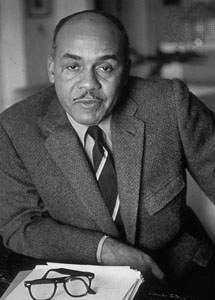Born on March 1, 1913 in Oklahoma City, Oklahoma Ralph Waldo Ellison entered the world with a name that almost presumed for him a literary career. But his road to and in literature would be torturous. Many of the initial comforts enjoyed by Ellison vanished when his father died in 1916. His mother worked long and hard to insure that Ralph Ellison had an education, but the family existed in precarious economic circumstances. When an opportunity arose for Ralph to escape from home, he jumped at it, enrolling in 1933 as a music student at Tuskegee Institute in Alabama. While Ellison learned much about music at the school, he also spent an immense amount of time and energy devouring modern literature at the school library.
Like many young black men with literary aspirations, Ellison headed to Harlem, New York in 1936, to make it as a writer. Possessed with tremendous confidence, Ellison quickly made friends with some of the leading lights in the African American literary constellation. During the period of the 1930s, Ellison was associated with the Communist Party, when that organization appeared for many African Americans as a natural ally in the fight for civil rights and as supportive of black writers. Like his friend and initial mentor Richard Wright, Ellison came to chafe at the political discipline imposed by the party, and he had by the 1940s separated himself from it.
After a stint in the Merchant Marine during the Second World War, and after having published pieces in various communist-affiliated journals, Ellison set himself to the task of writing an important novel that would capture the reality of African American life in all of its complexity while also appealing to the universal experiences of humanity. The final product, Invisible Man, published in 1952, brimmed with experimental technique, wry humor, and energy. The book won Ellison the National Book Award.
The “Invisible Man” of the title served as a powerful metaphor for the black and human condition. The main character, in this bildungsroman, is unformed at first, a creature of naïve illusions. He learns from his experiences at a black college, as an industrial worker, and as a political activist. But insight comes hard, and it forces him to retreat, into a cellar garishly illuminated with blinding light-bulbs run on electricity stolen from the power company. But the Invisible Man determines at the end of the novel that the time has come for him to emerge from his hibernation and to act in the world, for he has lessons to communicate and he realizes that perhaps “on the lower frequencies, I speak for you?”
Many analysts of Ellison as a writer focus on his failure to produce a second novel during his lifetime. Snippets of a new work appeared from time to time in literary journals, and the bulk of it was assembled posthumously in a volume, Juneteenth (1999). Some posit that Ellison, always a perfectionist, was handcuffed by the success of Invisible Man. Others suggest that the fire that destroyed an early draft of the novel proved too overwhelming for Ellison to overcome.
Although Ellison failed at his second novel, he maintained a strong and controversial voice as a cultural critic in the 1950s and 1960s. In essays published in two volumes, Ellison rejected all writers that shirked craft in favor of making a political point. He rejected sociologists that stressed the pathology of black lives in favor of a view that highlighted the richness of black cultural traditions. He viewed American culture and African American culture as joined, rather than as separate entities. He celebrated a type of existential commitment to art, focusing on the individual rather than the collective.
The racial and political radicalism of the 1960s alienated many from Ellison’s rather elitist views of art and culture. Some charged that Ellison was unwilling to use his influence to help aspiring black writers and that his literary aesthetics were contrary to black liberation. He also persisted in supporting the war in Vietnam. Ellison died on April 16, 1994. Despite the controversies that hounded him during his life, his novel and his critical essays remain monumental contributions to American literature.

